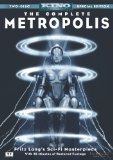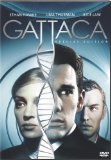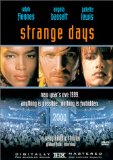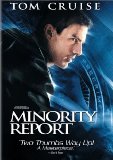CLICK HERE FOR THE 2015 UPDATE OF THIS LIST!
To be included on this list, the film had to focus on futurist themes such as technology or an examination of utopian/dystopian society. I will explain with each choice just what these themes are exactly, but it’s worth keeping in mind that this isn’t just a list of great sci-fi films – but specifically of great films which also have a futurist aesthetic or theme. It will also be completely (well, almost completely) spoiler free.
In order to ethically display the cover images of each film, I’ve linked through to their Amazon product counterpart – all of these links are affiliate links that help support Future Conscience whilst providing you with high-quality films.
I hope you enjoy this Future Conscience list of Top 10 Futurist Movies.
 10. Metropolis (1927) – This film is the patriarch of futurist cinema, the great-great-grandaddy of them all. A silent film, it keeps you interested with its wonderful sets evoking the then brand new Art Deco style and using it to depict a vast future city of both luxury and hardship. It’s notable from a futurist perspective mainly for being one of the first films to feature the concept of an android, exploring the dichotomy between human and machine. It also set the groundwork for many future films in highlighting the dystopian reality that often lies behind utopian facades; here presented as a scathing attack on what could be one outcome of industrialised capitalism taken to its extreme.
10. Metropolis (1927) – This film is the patriarch of futurist cinema, the great-great-grandaddy of them all. A silent film, it keeps you interested with its wonderful sets evoking the then brand new Art Deco style and using it to depict a vast future city of both luxury and hardship. It’s notable from a futurist perspective mainly for being one of the first films to feature the concept of an android, exploring the dichotomy between human and machine. It also set the groundwork for many future films in highlighting the dystopian reality that often lies behind utopian facades; here presented as a scathing attack on what could be one outcome of industrialised capitalism taken to its extreme.This juxtaposition of utopia/dystopia is a theme that continues to run throughout the science fiction genre and for the most part we have Metropolis to thank for that. Great film, and the one that really started it all.
 9. Splice (2009) – This film I really enjoyed because it kind of came out of nowhere. I hadn’t heard anything about it and then all of a sudden it was working the film festival circuit and getting some great coverage. Focusing on themes of genetic engineering, Splice certainly deserves to be included in our list because of its focus on the pretty clear issues which might arise from us being too flippant with the building blocks of life.
9. Splice (2009) – This film I really enjoyed because it kind of came out of nowhere. I hadn’t heard anything about it and then all of a sudden it was working the film festival circuit and getting some great coverage. Focusing on themes of genetic engineering, Splice certainly deserves to be included in our list because of its focus on the pretty clear issues which might arise from us being too flippant with the building blocks of life.
I don’t want to pass on any spoilers, but it doesn’t pull its punches and has some pretty shocking moments. It’s also from the same director that brought us the sublime Cube, Vincenzo Natali.
 8. I, Robot (2004) – Anything based on the works of Isaac Asimov is going to have a solid foundation to build upon, and despite some people not really enjoying this movie it certainly makes a great futurist film that shouldn’t be missed. The boundaries of artificial intelligence and robotic technology has always fascinated futurists and this film does a great job of exploring the line between human and artificial personalities.
8. I, Robot (2004) – Anything based on the works of Isaac Asimov is going to have a solid foundation to build upon, and despite some people not really enjoying this movie it certainly makes a great futurist film that shouldn’t be missed. The boundaries of artificial intelligence and robotic technology has always fascinated futurists and this film does a great job of exploring the line between human and artificial personalities.
A lot of work has also gone into realising other elements in the dense urban environments of 2035, and in many ways they’ve chosen to go for a more subtle approach than other extravagant depictions of the future that makes the world feel both familiar and greatly advanced at the same time. Another under-rated movie, although not as over-looked as Strange Days, and one that I feel is a great adaptation and expansion of Asimov’s original concepts.
 7. The Road (2009) – When I mention a list of my top ten futurist films, The Road is probably not one anybody would guess would be on here. It doesn’t depict the multi-tiered metropolises of an overpopulated future; nor does it contain confrontational struggles with fancy new technology. It doesn’t do any of these things, but yet it still feels like a genuine futurist film for one simple reason: it shows us a Hell on Earth that could actually come about with our reckless regard for the planet and, often, each other.
7. The Road (2009) – When I mention a list of my top ten futurist films, The Road is probably not one anybody would guess would be on here. It doesn’t depict the multi-tiered metropolises of an overpopulated future; nor does it contain confrontational struggles with fancy new technology. It doesn’t do any of these things, but yet it still feels like a genuine futurist film for one simple reason: it shows us a Hell on Earth that could actually come about with our reckless regard for the planet and, often, each other.
The cataclysmic landscape of post-apocalyptic life is shown here in all of its disturbingly brutal reality, highlighting even more so the effect that such a situation has on human psychology and the subsequent breakdown of the social contract. Futurism isn’t always about shiny technology. Sometimes it’s about figuring out just how we will maintain our humanity when faced with great trials and tribulations.
 6. Gattaca (1997) – A film exploring just what happens when we allow our knowledge of genetics to control the way society functions down to every small detail. If that isn’t enough to put it on this list, then I’m not quite sure what is! It also manages to blend in themes of an oppressive surveillance state as well as questioning the nature of happiness and fulfilment, all wrapped up in an almost film Noir aesthetic that I enjoyed very much.
6. Gattaca (1997) – A film exploring just what happens when we allow our knowledge of genetics to control the way society functions down to every small detail. If that isn’t enough to put it on this list, then I’m not quite sure what is! It also manages to blend in themes of an oppressive surveillance state as well as questioning the nature of happiness and fulfilment, all wrapped up in an almost film Noir aesthetic that I enjoyed very much.
A really good exploration of the ethical struggles we are going to face with the rapidly increasing power of science and technology to influence our lives.
 5. Strange Days (1995) – I’m a massive fan of the cyberpunk genre, and Strange Days is one of the few films outside of the world of Anime that has really gotten it right. The futurist elements surround the notion that we might be able to relive other people’s memories (or our own) as if we were experiencing them as reality. Sensations both emotional and physical are recorded to be experienced by anybody at any time; even ones so dark and disturbing that they can only be supplied through a black market.
5. Strange Days (1995) – I’m a massive fan of the cyberpunk genre, and Strange Days is one of the few films outside of the world of Anime that has really gotten it right. The futurist elements surround the notion that we might be able to relive other people’s memories (or our own) as if we were experiencing them as reality. Sensations both emotional and physical are recorded to be experienced by anybody at any time; even ones so dark and disturbing that they can only be supplied through a black market.
It’s a wonderful take on the possibilities of neurological interfacing, and a technology we are very likely to see become reality at some point in the medium-term future. Plus, the film uses MiniDiscs as props to evoke a sense of the future; something I’m always a fan of as I was one of the very few people who early-adopted the technology at the time and loved it (they can also be seen in the first Matrix movie).
If you’re a fan of cyberpunk you’ve likely already seen this, but for everybody else it’s definitely worth tracking down to see an under-rated classic.
 4. Ghost in the Shell (1995) – Anime and futurist worlds have always gone together, and Ghost in the Shell is arguably the pinnacle of the genre when it comes to our specific criteria. Exploring a world implicitly connected to the internet and its information network, alongside the philosophical dilemmas of artificial intelligence and the nature of reality when we are capable of replicating and manipulating it through neurological means.
4. Ghost in the Shell (1995) – Anime and futurist worlds have always gone together, and Ghost in the Shell is arguably the pinnacle of the genre when it comes to our specific criteria. Exploring a world implicitly connected to the internet and its information network, alongside the philosophical dilemmas of artificial intelligence and the nature of reality when we are capable of replicating and manipulating it through neurological means.
One of those films that helped show the ‘Western’ world that cartoons weren’t just for kids and could deal with some incredibly complicated issues in a way that live action film often cannot.
 3. Blade Runner (1982) – I mentioned earlier that Metropolis influenced many films within the futurist sub-genre, and Blade Runner is one of the most obvious ones. Blade Runner then went on to clearly influence the previous entry, Ghost in the Shell, which is also partly why all three are here.
3. Blade Runner (1982) – I mentioned earlier that Metropolis influenced many films within the futurist sub-genre, and Blade Runner is one of the most obvious ones. Blade Runner then went on to clearly influence the previous entry, Ghost in the Shell, which is also partly why all three are here.
Based on a rather heavily modified version of the Philip K Dick novel Do Andriods Dream of Electric Sheep, it really was this film that brought the issues of android life and emotional reality into general consciousness. The Film Noir aesthetic also adds greatly to the ominous tone of the movie, strengthening the pivotal themes of the boundaries of the human condition.
It didn’t do too well upon initial release, but it has since rightly been deemed a classic and gone on to influence pretty much all depictions of dystopian metropolis landscapes since. It has also introduced more than one generation to the literary works of Philip K Dick – an accolade in its own right.
 2. District 9 (2009) – I did a review on this right here on this blog, and to be honest it’s kind of nice to know that Future Conscience is still going strong! What District 9 achieves is a believable examination of what might occur where we to come into contact with an alien species. The ethical themes surrounding xenophobia are done justice, as well as delving into themes of genetic engineering (and even nanotechnology if you look into the back-story beyond the movie itself) as well as the effects of increasing the militarisation of society.
2. District 9 (2009) – I did a review on this right here on this blog, and to be honest it’s kind of nice to know that Future Conscience is still going strong! What District 9 achieves is a believable examination of what might occur where we to come into contact with an alien species. The ethical themes surrounding xenophobia are done justice, as well as delving into themes of genetic engineering (and even nanotechnology if you look into the back-story beyond the movie itself) as well as the effects of increasing the militarisation of society.
Rather than repeat many of the things I have said earlier about the film, check out the review of District 9 here.
 1. Minority Report (2002) – So we have our number one position, and no surprise it’s another Philip K Dick adaptation. So why does this film deserve the number one spot in our list? Well, primarily because the future has been so well realised to a staggering degree of detail.
1. Minority Report (2002) – So we have our number one position, and no surprise it’s another Philip K Dick adaptation. So why does this film deserve the number one spot in our list? Well, primarily because the future has been so well realised to a staggering degree of detail.
The themes of social profiling (minus the precog slant) and the holographic interfaces are becoming remarkably real even in just the few years since this film came out, and a lot of effort was put into the design of technology for the film.
Beyond all of this (and despite the inclusion of Tom Cruise as lead) the film is just a great piece of entertainment that doesn’t delve into the pretentious cinematography that Blade Runner is sometimes (rarely, but still…) guilty of. It was also incredibly well received by critics, at the box office and later on DVD; which means that it brought futurist thought right into the mainstream agenda for at least a short period of time – if nothing else, this deserves it first place!
Special Mentions
There are a number of films that couldn’t make the list, which is always a problem with these kinds of things. One thing I was very aware of is that I tended to overlook many older films, so I wanted to mention a few of them here.
The main reason many older films were overlooked is because it hasn’t been until the last few decades that we’ve really understood the true landscape of futurist possibility. I tend to find many of the early films too quaint, rather than thought provoking and challenging. If you can think of any that I’ve definitely missed out please leave a comment! Until then though, here are a few special mentions:
The Matrix (1999) – What a way to end out the 20th century with this mega-dystopian vision. I’m not too sure why it didn’t end up on the list, to be honest, but I think it has a lot to do with the terrible sequels which really messed with my nostalgia and appreciation for the first one. The original though, was undoubtedly an amazing film and at the time brought to the mainstream so many futurist ideas that it really does deserve a place in the top 10…consider it an equal #6 with Gattaca. Virtual realities, crazy A.I., there is no spoon…definitely worthy of any futurist movie marathon. Still can’t figure out why I didn’t include it, but there you go.
Things to Come (1936) – A great look at the technological ideas of progress and how such ideals can overcome many issues, but often replacing them with an unsatiable desire for progress without knowing really what such a thing is.
Logan’s Run (1976) – Another classic film that really highlighted the dystopian elements that often lie behind utopian luxury societies – one where issues of overpopulation are solved in the most simplistic form available. The ecstatic ritualisation of depopulation is particularly eery viewing, providing the nexus between utopia and dystopia and showing that both can exist simultaneously.
The films of Philip K Dick – There were way too many films created from Philip K Dick stories that deserved to be on this list. So I picked the two best ones, but have to give notice to pretty much all of the other ones. Fact remains, Philip K Dick is one of the most underrated authors of the 20th century and we are only just starting to truly appreciate his body of work. Hollywood has been mining it for years (Total Recall, Paycheck, A Scanner Darkly), and continue to do so with force with many new films such as the fantastic Radio Free Albemuth and The Adjustment Bureau.
Did I miss anything? What are your favourite futurist movies? Let us know with a comment!




